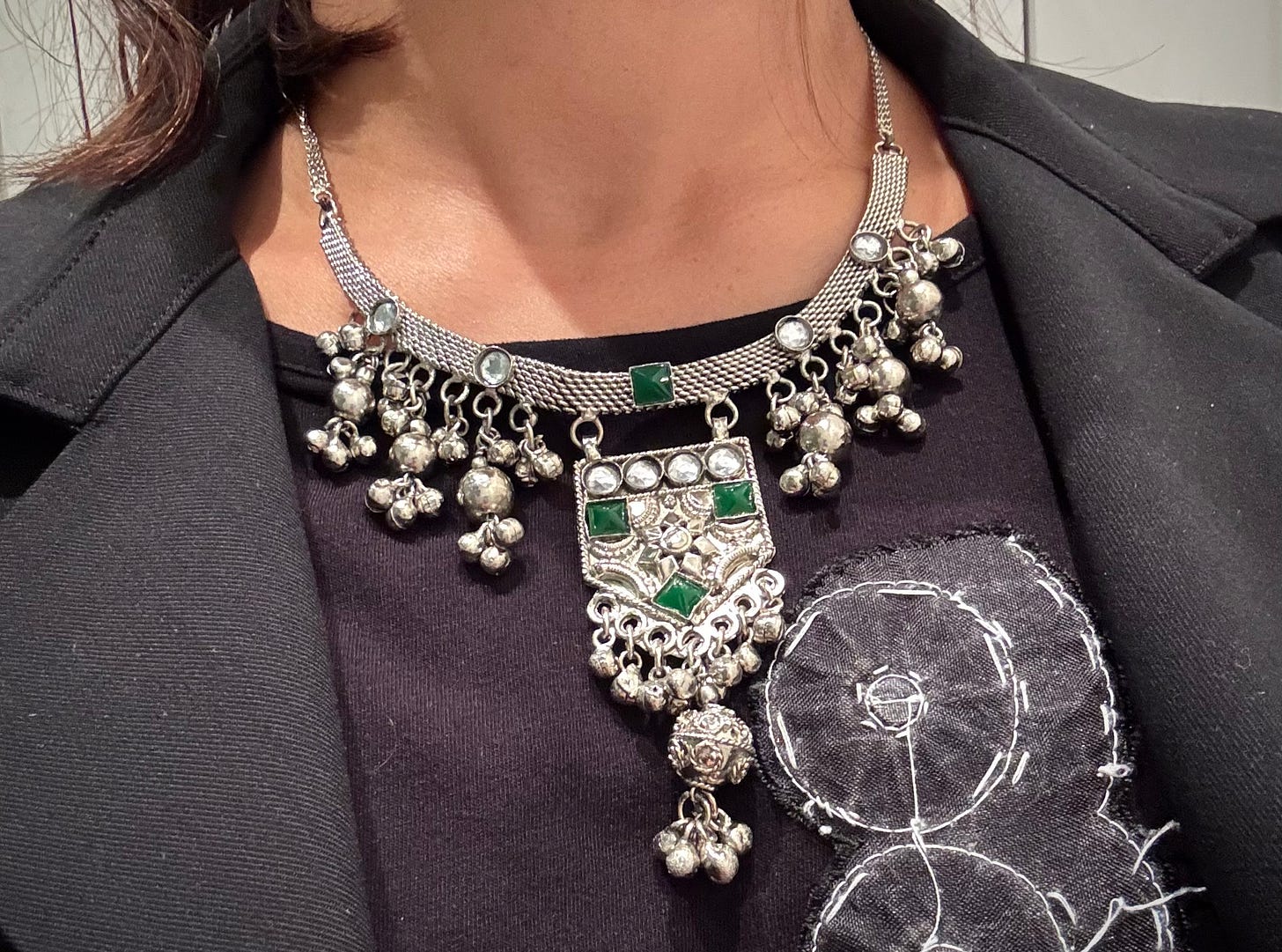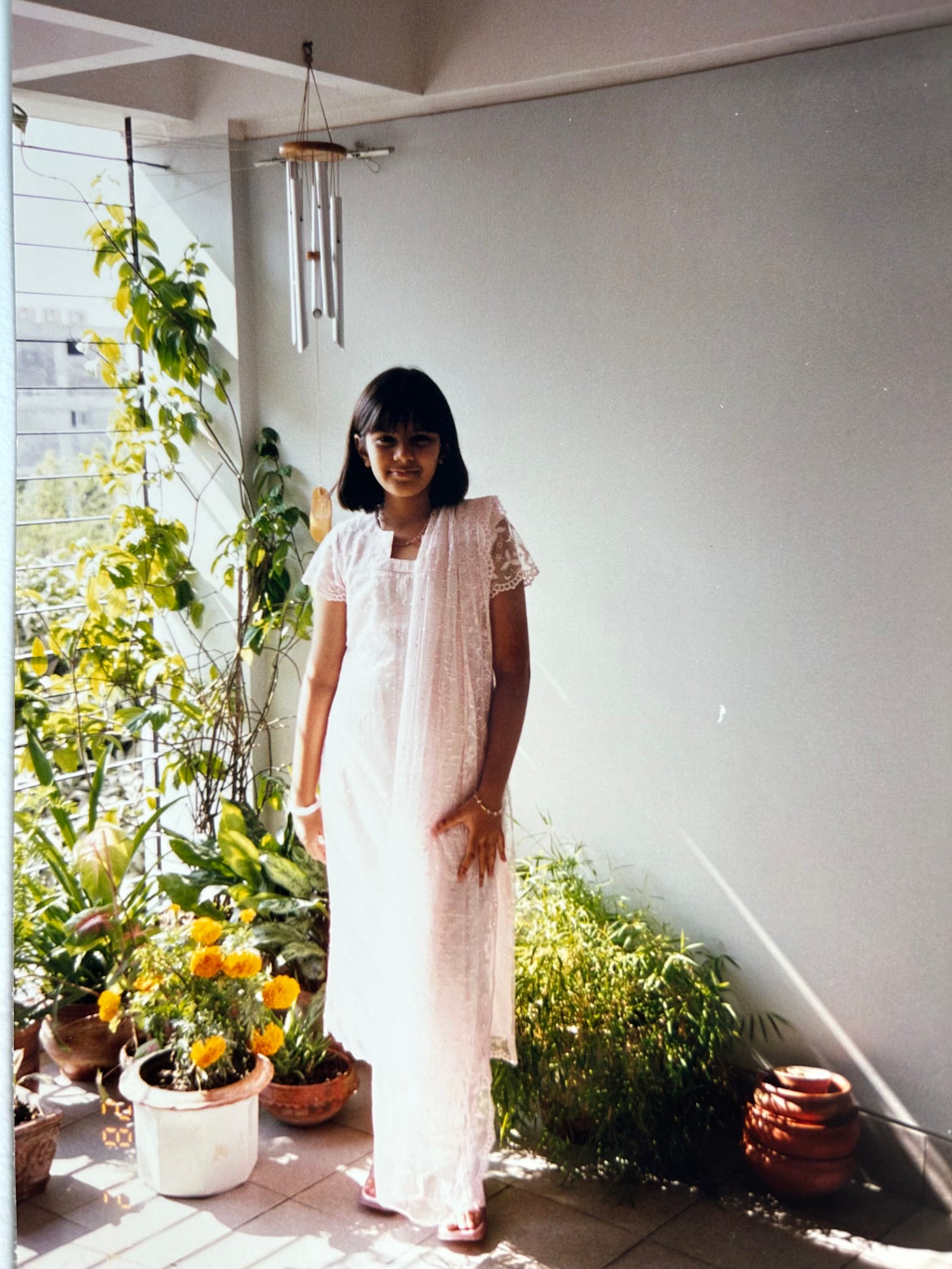062: Of Sentimental Value
An antique silver necklace and the language of home
I grew up speaking two languages at the same time, English and Bangla. Scholastically, English took precedence. For the first six years of my life, I lived with my parents in a suburb outside of London. It was in English that I was taught to read and write and think and play. At home, my parents spoke to one another in Bangla, but the three of us together spoke in a combination of the two. My father was interchangeably Abba and Dad, and my mother Amma and Mum. These designations did not serve specific roles, and I grasped at whichever came first to express distress or affection or dissatisfaction.
When I moved to Dhaka at age six and a half, I joined a school where the curriculum was taught in English. During my parents’ childhoods, these schools were few and far between; by the time they had a child of their own, it was considered the height of fashion. At my school, we were occasionally cautioned that speaking Bangla outside of our Bangla language class was an offense. The poetry of Rabindranath Tagore and Kazi Nazrul Islam flew right over my head, and I could scarcely make sense of their words. It was not until I was in my twenties that I would know Satyajit Ray as anything but a writer of the detective series Feluda. I could not wait to be in the sixth grade, the year Pride and Prejudice would be on the syllabus. To read this mythic novel was a rite of passage for twelve year old girls at my school. The boys could take it or leave it.
I have now lived the majority of my life far beyond the boundaries of my motherland. English has become the dominant language. It is the language I use to communicate to my husband I love you or you’re getting on my nerves. It is the language I continue to read and write and think in, though there is less time for play. Bangla punctuates my day in brief spells. When I am on the phone with my parents, we speak in Bangla. If I am speaking to an aunt or uncle, I insist on using Bangla, and they carry on in English. To my cat, I speak in Bangla, though she is not much of a skilled conversationalist. Despite the prevalence of English in my life, there are certain things I am only able to communicate in Bangla, and there is a life so hard to conceive of in the former yet so ordinary in my life in Bangla.
Recently, I wore a silver necklace given to me by my mother and grandmother. On a trip to Dhaka a few years ago, my mother found it at an antique shop she and I used to frequent when we still lived there. It was located on the second floor of a market where we would buy, for a steep price, imported Lays (as a treat) and Lurpak butter (to be used with discretion). The antique shop was not just so – it was also a place where custom leather jackets and shoes could be ordered, mainly by foreigners whose careers brought them to the city for a year or three, and they had a jewelry display by the entrance where one could not only find antique jewelry, but have custom jewelry made with pearls and beads. One year, I amassed a collection of long pearl necklaces.
When my mother came across this necklace, time had leant it a dull patina. A few stones were missing and others broken, but my grandmother assured her it could be salvaged. My grandmother knew a person whom she referred to as rupar lokh, directly translated as silver person, or silversmith. My grandmother had known his father, then the son, from the time my mother and aunts had married, and it was from them she had her daughters’ jewelry made, and then, when they had fallen out of fashion, returned to melt them down to be made anew. The silversmith, and then his son, knew my grandmother not by her name, but by the number of the road she lived on, so she was Road 5 aunty, which sounds not even half as amusing as paach numberer khalamma. In fact, I was so used to my grandmother being referred to as paach numberer khalamma, and it seemed so powerful that she should be known as a sort of doyenne of that road, that her real name sounded alien to me. The necklace was polished and restored, and my mother and I decided that we would have the stones replaced in America, once she returned.
Now where in America would we have the stones replaced? Jewelry stores were exorbitantly expensive, and craft supply stores too artificial. In Dhaka, it was strange not to have a lokh. There was of course, the rupar lokh, but one might also have a gaser lokh, for when the kitchen stove kicked up a fuss, or an aamer lokh, who procured the best mangoes of the season. And then there was the maacher lokh, from whom my grandmother would buy her fresh-caught fish.
The title of bhai, or brother, and in my case, uncle, was given to those from whom we bought fabrics for clothing and furnishings, and to those tailors responsible for bringing our poorly-sketched fantasies of new outfits and draperies to reality. It was most ordinary to have clothes made to measure and in one’s own vision than to walk into a store to buy something ready made and mass produced. Even at Bongo Bazaar, where clothes rejected by Gap and H&M and Zara were resold, each piece had its own idiosyncrasy: one sleeve slightly longer than the other, a back pocket stitched to the front, mismatched buttons.
So, on another trip to Dhaka, the necklace went back with my mother, and she and my grandmother returned to their rupar lokh to have green stones set where they were once gone.
As I removed the necklace and returned it to its pouch, nestled amidst the jumble of jewelry contained and kept out of view in a glass mirrored box, I thought of how it had come to be in my life. The antique shop on the second floor of Gulshan 2 market, if it is even there anymore; the rupar lokh capable of silverwash and other forms of magic; my late grandmother, known to me as Nanu, known to others as paach numberer khalamma. Onno ekta jibon, a different life, as my mother would often say after we left Dhaka.
There is a life so hard to conceive of in the former yet so ordinary in my life in Bangla. Onno ekta jibon.



